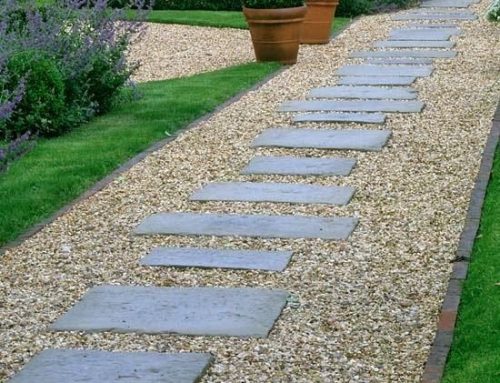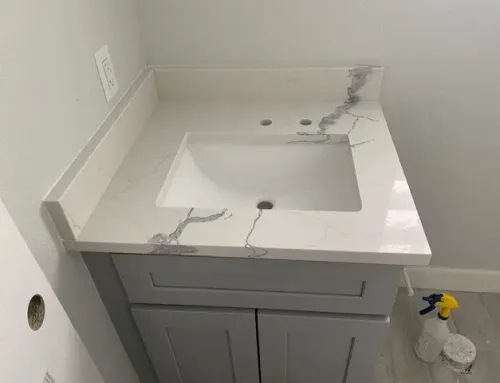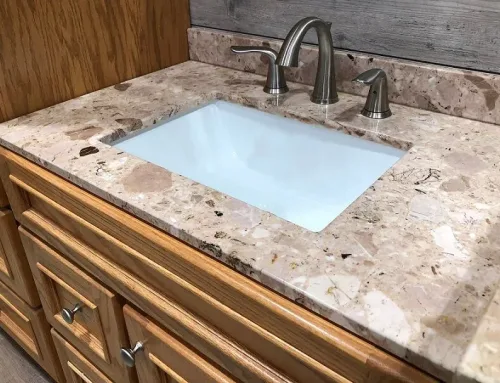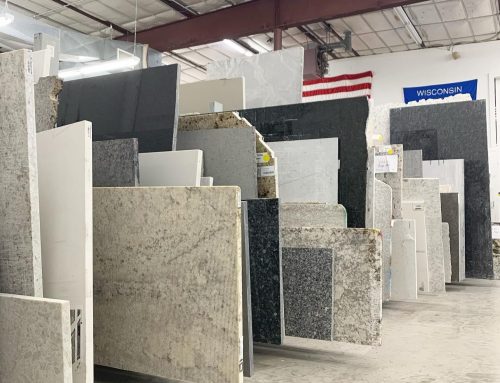What countertops to avoid? When choosing the perfect countertop for your kitchen or bathroom, the material you select can make all the difference. While many options are available, not all countertops are created equal. Some materials may seem appealing due to their low cost or trendy appearance but often come with major drawbacks. If you’re looking for longevity, durability, and timeless beauty, you should avoid certain countertop materials and stick with natural stone. Here’s why:
1. Laminate Countertops
Laminate countertops are among the cheapest options available, but they come with several disadvantages:
- Easily Damaged – Susceptible to scratches, burns, and chips.
- Not Heat-Resistant – Hot pans can cause permanent damage.
- Lacks a Luxurious Look – Often looks artificial compared to natural stone.
- Short Lifespan – Typically needs replacement after a few years.
2. Butcher Block Countertops
While wooden countertops have a warm, rustic appeal, they require extensive maintenance and are not ideal for long-term use:
- Prone to Staining – Wood absorbs liquids easily, leading to stains and bacteria buildup.
- High Maintenance – Requires regular sealing and conditioning.
- Easily Scratched & Dented – Softwood is highly susceptible to damage.
- Not Heat-Resistant – Hot pots can scorch the surface.
3. Tile Countertops
Tile countertops might seem like a budget-friendly alternative, but they come with several downsides:
- Grout Lines Are a Nightmare – Difficult to clean and prone to staining.
- Uneven Surface – Can make food prep inconvenient.
- Fragile Tiles – Can chip or crack easily with impact.
- Outdated Look – Tile countertops are not as stylish or high-end as natural stone.
4. Concrete Countertops
Concrete countertops have gained popularity for their modern and industrial look, but they have significant drawbacks:
- Requires Regular Sealing – Concrete is highly porous and can stain easily.
- Prone to Cracking – Natural settling can cause fractures over time.
- Heavy and Difficult to Install – Requires professional installation and additional support.
- Limited Design Versatility – Lacks the natural beauty and depth of real stone.
5. Solid Surface Countertops (Acrylic & Resin)
Solid surface countertops, like Corian, attempt to mimic the appearance of natural stone but fall short in quality:
- Scratches & Dents Easily – Not as durable as natural stone.
- Not Heat-Resistant – Can burn or melt when exposed to hot items.
- Artificial Appearance – Lacks the unique veining and variation of real stone.
Why Natural Stone is the Best Choice
Now that we’ve covered materials to avoid, let’s talk about why natural stone countertops are superior:
- Durability – Materials like granite, marble, and quartzite are incredibly strong and long-lasting.
- Heat & Scratch Resistance – Natural stone withstands high temperatures and daily wear.
- Timeless Beauty – Each slab is unique, offering rich patterns and luxurious aesthetics.
- Increases Home Value – Adds sophistication and long-term investment value.
- Low Maintenance – With proper sealing, stone countertops resist stains and bacteria.
Best Natural Stone Options
- Granite – Tough, heat-resistant, and available in various colors.
- Marble – Elegant with classic veining, perfect for luxurious spaces.
- Quartzite – Extremely durable and mimics the beauty of marble.
- Soapstone – Unique texture with high heat resistance.
Final Thoughts
So what countertops to avoid? While many countertop materials may seem appealing, they often lack the durability, aesthetic, and value that natural stone provides. If you’re investing in a new countertop, choose wisely—stick to natural stone for a combination of beauty, strength, and longevity. Your home will thank you for it!





